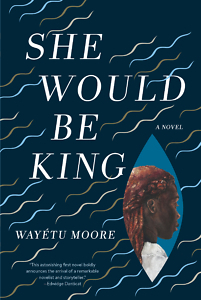Exiles, Ex-slaves, and Extraordinary Times
Wayétu Moore talks with Chapter 16 about her debut novel, She Would Be King
Wayétu Moore stopped by Memphis last month to see some of her relatives. Born in Liberia, Moore spent part of her childhood in the Bluff City before her family moved to Texas. Relatives and ancestors play a large role in her novel about the early days of Liberia, She Would Be King.

As the novel opens, Gbessa is a young girl in the village of Lai in what is now Liberia. She has red hair and is considered a witch. Exiled from the village, she must find some way to fit into a world which has condemned her. Meanwhile, June Dey, known by the name Moses on the Virginia plantation on which he is enslaved, discovers he has an extraordinary ability when his mettle is tested. And Norman Aragon, born after a rape in Jamaica, has powers of his own. These three outcasts must find their ways back to Africa to play their roles in the fight for Liberia’s future.
What follows is an edited excerpt from a longer interview available by podcast.
Chapter16: When you first started writing what would become She Would Be King, did Gbessa or another character come to you first, or had you simply wanted to write a story about the early days of Liberia?
Wayétu Moore: There’s an aphorism that exists in my mother’s ethnic group, the Vai people: “Be kind to cats.” They have a story where an old woman beats her cat to death, and then the cat jumps on the roof after he is dead and kills the old woman. This was something that was passed down for some generations.
In 2008 or so, it was my first try at writing African literature. When I wanted to expand this story, I asked myself, what happens after this? Of course when I wrote it out, I gave her a name, the people in the village names and personalities, but I very much wanted to explore the history of Liberia. In writing about this woman and her cat, it gave me a window into the exploration of the Vai people, one of sixteen indigenous groups in what is now Liberia.
 Chapter16: There’s a first-person narrator whose identity we don’t really know at the beginning.
Chapter16: There’s a first-person narrator whose identity we don’t really know at the beginning.
Moore: The story was originally written in third person, but I changed to first person because I think in telling Gbessa’s, the heroine’s, story, that it was important this story and Liberia’s story be told by an ancestor in some way. I didn’t think it should be Gbessa because a lot of what she was experiencing was external to her, and I wanted those characters and those storylines to be fleshed out, as well. So the first-person narrator I chose is the most accurate ancestor of Gbessa’s, with the marriage of the complexity, the nuance, and the musicality that is being a black woman.
Chapter16: Gbessa was deemed a witch, and this was at a time there were still a few women being tried as witches in Europe, as well.
Moore: One of the really wonderful things about having conversations about this book is being able to talk about some of these comparisons between African deities, spirituality, and religions versus with what was going on in the West at the time. Because, I think, unfortunately within the continent what was happening, obviously because of imperialism and colonialism, is that a lot of these things were being suppressed. And so I think the difference is that because black bodies are seen as uncivilized, whatever they were doing was considered as uncivilized. It wasn’t even a consideration to compare it to whatever was happening in Western countries.
Chapter16: The main characters find each other in Liberia, but almost as soon as they come together, fate’s winds cast them apart again. This is not a traditional narrative that we know in the West.
Moore: None of the stories that I was used to hearing had straight narratives. No boy meets girl, etc. There was no such formula. You’d say, Boy meets girl; boy meets other girl; something happens to girl’s uncle. But I think the stories that I was told when I was growing up were a form of realism, of maximalism, because you’re everywhere and wanting to tell everyone’s story. The central star is the theme, focusing on it, and these characters are just feeding into it.
To download a podcast of the full interview, please click here. To listen online, click the play button below:

Stephen Usery is the producer of Book Talk, an author-interview program which airs Saturdays at 11:30 a.m. CT on WYPL FM 89.3, a service of the Memphis Public Libraries and The City of Memphis.





